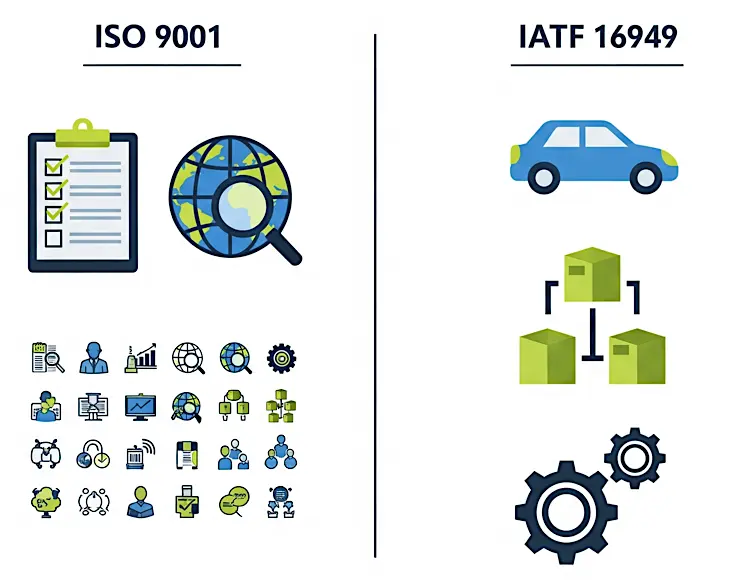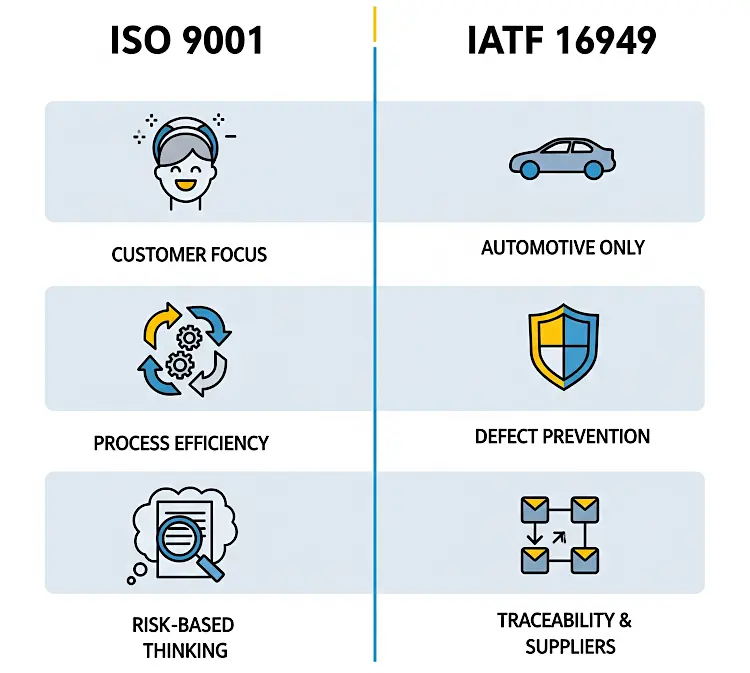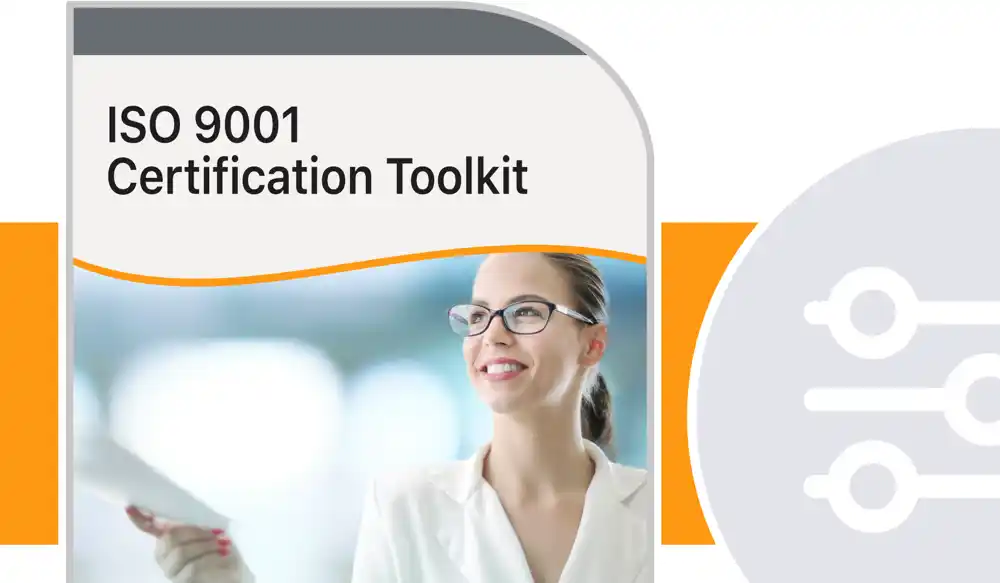IATF 16949 vs ISO 9001: Understanding the Key Differences
27 September 2023
IATF 16949 vs ISO 9001 is a common comparison for organizations working with quality management standards. Both standards focus on improving quality and customer satisfaction. However, IATF 16949 is designed for the automotive industry, while ISO 9001 is applicable to all industries.
If your organization is deciding which certification to pursue, you need a clear understanding of the scope, requirements, and benefits of each. At 9001Simplified, we provide ISO 9001 toolkits, training, and consulting services to help you implement the right system with less cost and time. Get started here.

What is ISO 9001?
ISO 9001 is the world’s most recognized quality management system (QMS) standard. Published by the International Organization for Standardization (ISO), it applies to any organization regardless of size or industry.
Key facts:
First published in 1987, with the latest version released in 2015.
Over one million organizations worldwide are ISO 9001 certified.
Focuses on customer satisfaction, risk-based thinking, process efficiency, and continual improvement.
Companies use ISO 9001 to streamline operations, improve product quality, and win customer trust. It is also often a requirement for tenders, supplier contracts, and regulatory compliance.
For businesses starting the journey, our ISO 9001 Certification Toolkit is a cost-effective, step-by-step solution.
What is IATF 16949?
IATF 16949 is a global quality management standard developed specifically for the automotive industry. It was created by the International Automotive Task Force (IATF) in collaboration with ISO.
Key facts:
Published in 1999 and revised in 2016 to align with ISO 9001:2015.
Required by many major automotive manufacturers worldwide.
Focuses on defect prevention, supply chain quality, and reducing variation in production.
IATF 16949 certification is not standalone. Organizations must first comply with ISO 9001, then add the IATF-specific automotive requirements.
IATF 16949 vs ISO 9001: Core Differences
While both standards aim to improve quality, their application differs.
Scope and Industry Focus
ISO 9001: General standard for all industries.
IATF 16949: Exclusive to the automotive sector and suppliers.
Certification Requirements
ISO 9001: Can be certified independently.
IATF 16949: Requires ISO 9001 compliance plus IATF-specific clauses.
Focus Areas
ISO 9001: Customer satisfaction, risk-based thinking, process improvement.
IATF 16949: Defect prevention, supply chain traceability, zero-defect goals.
Clauses and Requirements
Both share the same ISO 9001 structure but IATF adds clauses:
Product safety requirements.
Supplier development and monitoring.
Control of outsourced processes.
Specific rules for automotive parts, traceability, and warranty management.
Certification Value
ISO 9001: Opens opportunities across industries.
IATF 16949: Mandatory for Tier 1 and Tier 2 automotive suppliers.

ISO 9001 vs IATF 16949 Clauses
ISO 9001 has 10 main clauses, from context of the organization to continual improvement. IATF 16949 integrates all of them but adds unique automotive clauses:
Product Safety (8.4.2.3.1): Strong emphasis on defect-free products.
Customer-Specific Requirements: Every major automotive brand sets additional requirements.
Contingency Planning (6.1.2.3): Plans for supply chain disruptions.
Warranty Management (10.2.5): Tracking failures and recalls.
Supplier Development: Ensuring sub-suppliers follow quality systems.
These added clauses make IATF 16949 stricter than ISO 9001.
ISO 9001 vs IATF 16949 Differences Explained
The main differences are:
Applicability: ISO 9001 fits any sector, IATF 16949 fits automotive.
Structure: IATF builds on ISO 9001.
Customer focus: IATF enforces customer-specific automotive requirements.
Traceability: IATF requires detailed record-keeping for parts.
Certification process: IATF requires audits against both ISO and IATF standards.
For a deeper understanding, companies often request a gap analysis. Our Gap Analysis & Implementation Plan helps identify which requirements apply.
IATF 16949 Certification vs ISO 9001 Certification
When deciding between certifications:
Choose ISO 9001 if your business operates outside the automotive industry.
Choose IATF 16949 if you are part of the automotive supply chain.
Certification benefits include:
Improved customer trust.
Compliance with industry contracts.
Better process efficiency and cost reduction.
We support organizations with ISO 9001 Certification Services, including consulting, audits, and document preparation.

ISO 9001 vs IATF 16949 PDF and Resources
Businesses often look for PDFs comparing the two standards. You can download ISO 9001 requirement guides from our Free Downloads Section.
You can also explore detailed documents from the International Automotive Task Force (official site) and ISO’s Wikipedia for credible references.
Why Choose ISO 9001 Simplified?
Proven expertise: Thousands of successful clients worldwide.
Cost savings: Toolkits and online training reduce consulting costs.
Flexibility: Self-paced training, consulting, and full-service certification support.
Compliance confidence: Our consultants guide you through every clause.
Whether you need complete ISO 9001 certification solutions, specific consultancy services, or online training, we provide solutions that fit your organization’s size and budget.
Conclusion: IATF 16949 vs ISO 9001
The comparison of IATF 16949 vs ISO 9001 shows that while both aim at quality improvement, they serve different needs. ISO 9001 works for all industries, while IATF 16949 is a must for automotive suppliers.
If your company wants to improve processes, win contracts, and meet compliance, start with ISO 9001. Our ISO 9001 Certification Toolkit is the fastest and most affordable way to achieve it.


